Auer
[H]ard|Gawd
- Joined
- Nov 2, 2018
- Messages
- 1,972
Doesn't matter that one is handicapped or not, if they sell for the same price then they are in the same competitive range.
Right. So if you game only the 9700 is a better deal?
Follow along with the video below to see how to install our site as a web app on your home screen.
Note: This feature may not be available in some browsers.
Doesn't matter that one is handicapped or not, if they sell for the same price then they are in the same competitive range.
You can compare these CPU's in a review as I have done so in the past. I never compared them directly, but I did include numbers for the 9700K in the lineup.
I'm not defending the article from OP, or attacking your reasoning here Dan_D but as I lurk around the internet, I don't see the same logic applied when comparing AMD & nVidia GPUs and I find that both curious and disappointing.
This was to be a short two or three sentence post, but the more I thought about it characters just kept popping in.
Do we take the same approach when comparing similar priced AMD & RTX nVidia cards?
How about we forget about RTX for a moment, how about the hardware differences between the two architectures from even a high level, CUDA vs stream processors?
Completely different designs that both produce graphics for a consumer.
Based on reasoning in this thread, we should be defending AMD against RTX because their hardware isn't built the same and lacks certain features, so obviously their performance without these features is going to be less than nVidia RTX products?
Where is the line drawn, exactly?
Is it AMD's fault they are able to sell a product with twice as many threads at a similar price point as an Intel product?
If Intel quadruples their core/thread count tomorrow and sells at the same price as AMD, does AMD receive this much defense because obviously, comparisons are not going to be fair?
That's literally good business. Being able to offer a 'better' performing product at similar or lower price to consumers.
Price is the factor to a lot of people, it's the most valid and relevant comparison one can make.
However, it's up to the consumer to make that comparison and those reviewing the products shouldn't do it for them.
But, how then does one compare CPUs when use case scenarios are so varied and there's no one good metric to use?
It's newsworthy, and yeah the Tom's article kinda reads like a reach around for AMD, but after all the years of the roles being reversed, it's only fair. (up to a point!)
I'll tell you the same thing I tell everyone else. If your happy with your current gaming experience, then it doesn't make much sense to upgrade. If you aren't, then an upgrade is perhaps warranted. I know people ask questions like this because they want new hardware and aren't sure what to expect from teh change. The Ryzen 7 1700 isn't a great gaming CPU. It just isn't. It was well behind Intel's CPU's from several years ago on the gaming front. You would see quite an improvement upgrading to a 3600 but almost none going to a Ryzen 7 2600. There is a big change going from a 1st or 2nd generation Ryzen to the 3000 series. Especially where gaming is concerned. A Ryzen 5 3600 or 3600X would be a big upgrade on that front over a 1700.
As for a Vega 64, I know they are faster than the Vega56, but I am not really sure by how much. To be perfectly honest, if it isn't one of the top two graphics cards on the market, I don't pay too much attention to them. That said, a quick check on the subject seems to show that the Vega 64 isn't that much faster than the Vega 56 most of the time. However, the Radeon 5700 looks to be an alright upgrade over the Vega 56. However, I think that one depends on what resolution and quality settings your at. Sometimes it only seems to put out about 5-10FPS more, but sometimes that's in a game where the Vega 56 is running sub-60FPS. Those numbers don't sound like much but that's a pretty dramatic impact on your experience. Being at 49FPS and cracking 60FPS is a pretty big jump in performance. In other cases where you might be seeing 89FPS and jumping to 101FPS, it isn't as big a deal. 1%'s don't look much different between the two, but your averages do.
But again, that's a personal choice. Performance wise I say yes, but price is up to you. I'm the guy who buys $1,000+ CPU's and $1,200+ video cards. Naturally, I'm going to say yes as I can afford it. Where I tend to not take the upgrade is where the difference is well below 10% and the price is 40-50% more to get there.
It sure seems that way. As I said, it reads like someone is trying to fluff AMD for a porno shoot.
It's certainly spiraled downhill over the years. That's what happens when a media conglomerate buys your site and all it gives a shit about is ad revenue.
i think the 9700k being more expensive is the real thing wrong here.
If Intel doesn't lower prices, then people will simply not buy them except when they're looking for the specific advantages they bring...i think the 9700k being more expensive is the real thing wrong here.
We didn't use the 'thread' suffix because before Zen, AMD didn't have SMT. It was simply 'HT' added to the CPU name, at first, and for a while Intel didn't use HT at all. For AMD, Bulldozer was an ill-fated attempt at 'hardware SMT', but that can only be argued to be a form of SMT because AMD had to pay out for those extra execution units not being equal to more coreswell the 3700x is an 8 core cpu.
adding the suffix "thread" is a new thing.
we didn't call a q6600 4 core 4 threaded cpu now did we?
fluff amd for a porno shoot

To Dan's point though you wouldn't compare a $30,000 Camry and a $30,000 Subaru BRZ and claim the Camry is a better car because it seats more people. While that is true, it ignores the reason people buy a BRZ.I can’t believe toms would compare 2 CPUs in the same price range. Lulz.
Man, that was a dick move!snip
Eh I mean yes and no right. You would compare the utility of the money you are spending. I agree with your point about seats of course but at the end of the day we have a finite amount of resources. The BRZ definitely doesn't fit as many use cases as Camry, which is why it sells many less.To Dan's point though you wouldn't compare a $30,000 Camry and a $30,000 Subaru BRZ and claim the Camry is a better car because it seats more people. While that is true, it ignores the reason people buy a BRZ.
If you review both CPUs and ignore the gaming aspect of the 9700K - which is it's only actual strength at this price - you're abitrarily setting up the CPU to fail.
And I own two Ryzen systems so I am not biased at all in this respect.
The 3800x is a joke unless it is priced beneath a 3700x.
don’t believe me, just ask digital jesus
The average Joe won't see a difference. The chip has already seen deep sales because it ain't selling. Watch the video, read the reviews. It's a dud.The 3800X is a better binned part plain and simple. If you plan to actually overclock to reach maximum performance potential it will reach higher clocks on average than a 3700X.
The average Joe won't see a difference. The chip has already seen deep sales because it ain't selling. Watch the video, read the reviews. It's a dud.
If the only place anyone can °feel° a difference is with benchmarks than it's a dud in my book.Oh, so the ... snip
If the only place .... snip
Yes, the 9700K is 5-10% faster in games. That is really the only thing it is better in. The 3800x is cheaper and it comes with a cooler. I agree you shouldn’t discount games, but overall, the 3800x seems to be the better processor. Besides, if l was buying a processor strictly for gaming right now, I’d probably get the 3600 as it has similar performance for less money. And it still has more threads than the 9700K.
Totally agree there. If you have to have absolute best frame rates, you’re shelling out the money for best performance bar none.Yeah, from what I am seeing, unless you are running a 2080Ti, you will not benefit much at all from a 9700K. Of course, if you have a 2080ti, the 3900X or 9900K is probably the go to processor, at that point.
Yes, the 9700K is 5-10% faster in games. That is really the only thing it is better in. The 3800x is cheaper and it comes with a cooler. I agree you shouldn’t discount games, but overall, the 3800x seems to be the better processor. Besides, if l was buying a processor strictly for gaming right now, I’d probably get the 3600 as it has similar performance for less money. And it still has more threads than the 9700K.
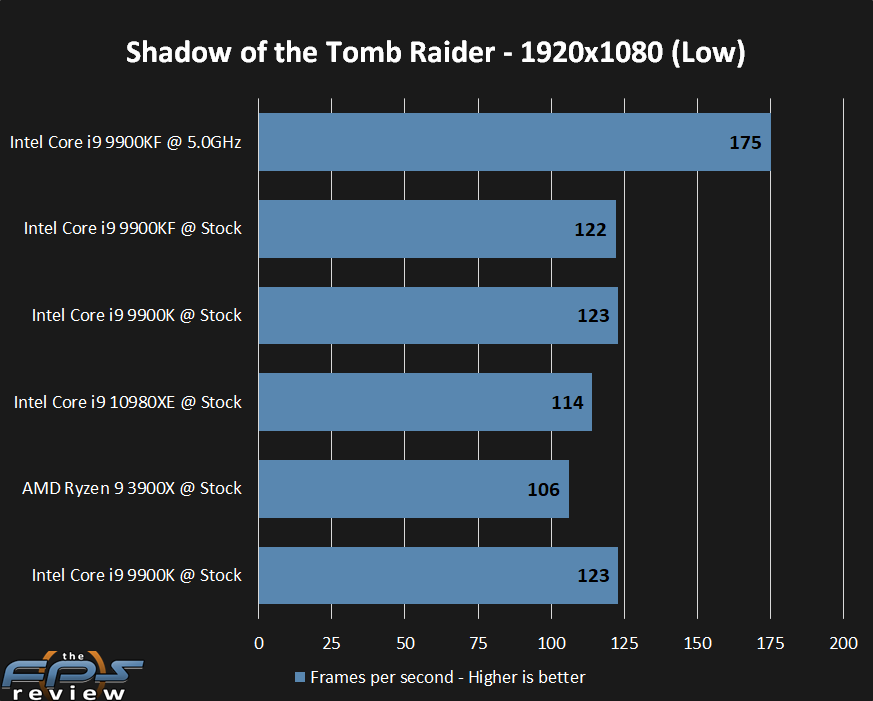
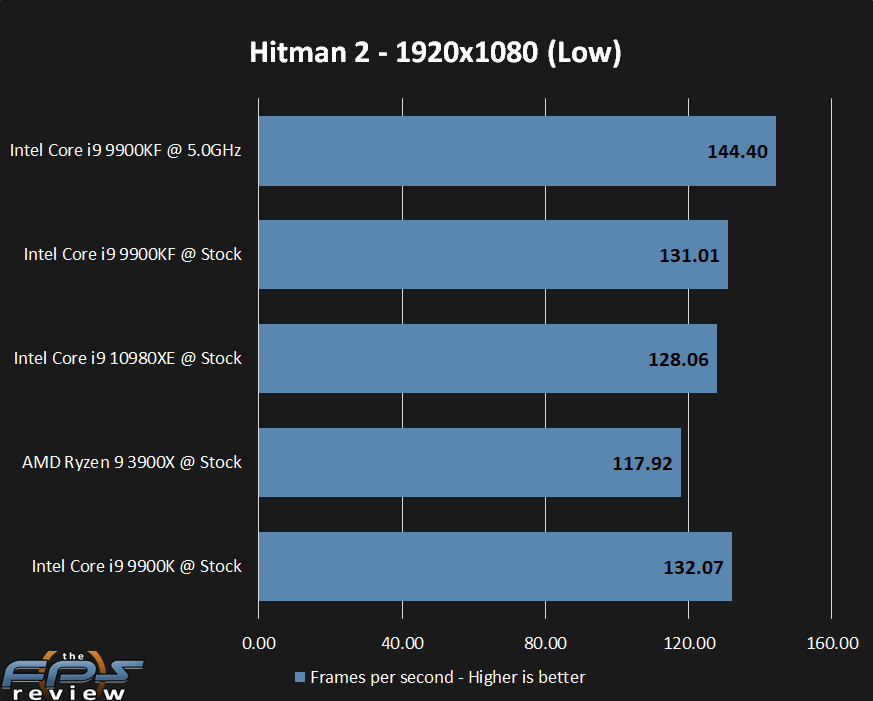
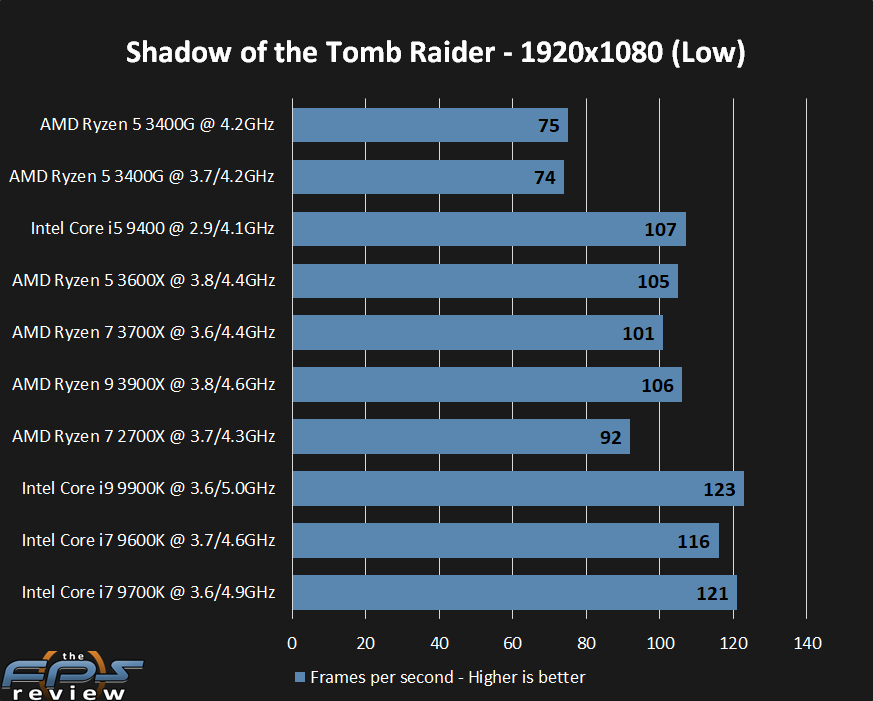
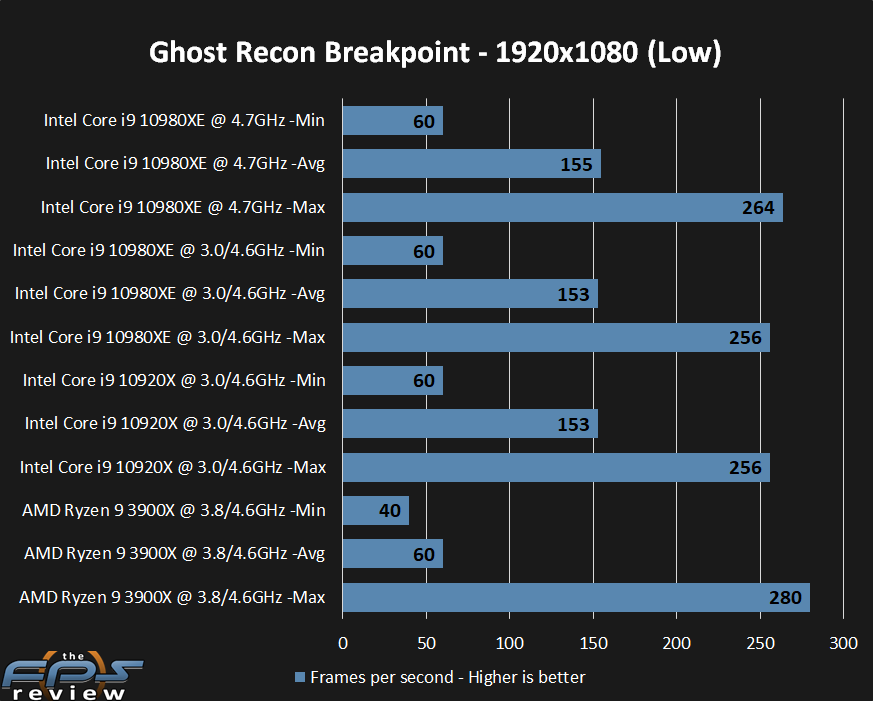
All of those are 1080p Low settings. What were the differences on medium and high? What GPU was used?The difference in gaming shouldn't be undersold. The Intel CPU's are roughly 6% faster in aggregate but can be as much as 15% faster or more in some isolated cases. You really need to look at the games you play. Initially, when AMD first got the 3000 series working on Destiny 2, they lagged their Intel counterparts by a much wider margin than that. This has since been corrected, but for a long time the Intel CPU's provided a substantially better gaming experience.
This is still the case in both Hitman 2 and Shadow of the Tomb Raider:
View attachment 226610
View attachment 226611
These are isolated examples where the frame rate improvement can be substantially higher on Intel CPU's going well beyond the usual 5-10% increase. That gap widens a bit if your lucky enough to get an Intel CPU to 5.1GHz.
Having said all of that, we are still splitting hairs at 1920x1080. At higher resolutions the data is slightly different. The gap is still there, but its somewhat less impactful unless you drop into the lower price points for CPU's.
View attachment 226612
Here you can see the Ryzen 2000 series taking a massive hit compared to their 3000 series counterparts. Also, the Ryzen 5 3400G isn't all that high end and gets trounced by the Ryzen 7 2700X. The 9900K has a distinct advantage here.
Here we can see the Ryzen 9 3900X struggle to maintain a 60FPS minimum that an Intel HEDT CPU can actually maintain consistently. What I've seen in some games on the AMD side was true here as well. The maximum FPS can often be higher than it is on Intel machines, but for some reason the lows are much worse. Usually the averages are the same or better than Intel's. Part of the problem, and the reason I've hated testing with the Ryzen 3000 series is that the AGESA updates and inconsistent boost clocking put their results all over the map.
View attachment 226613
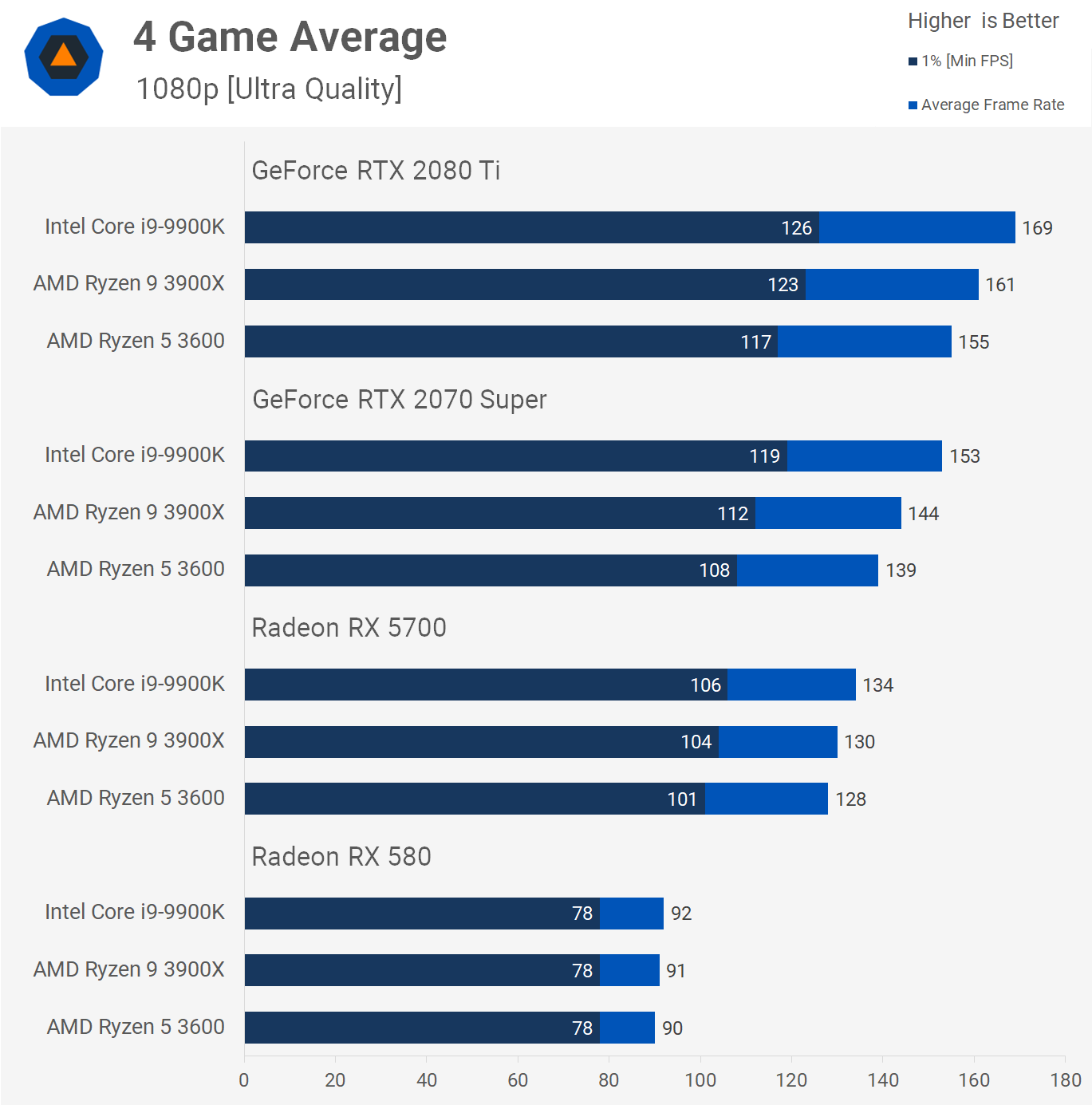
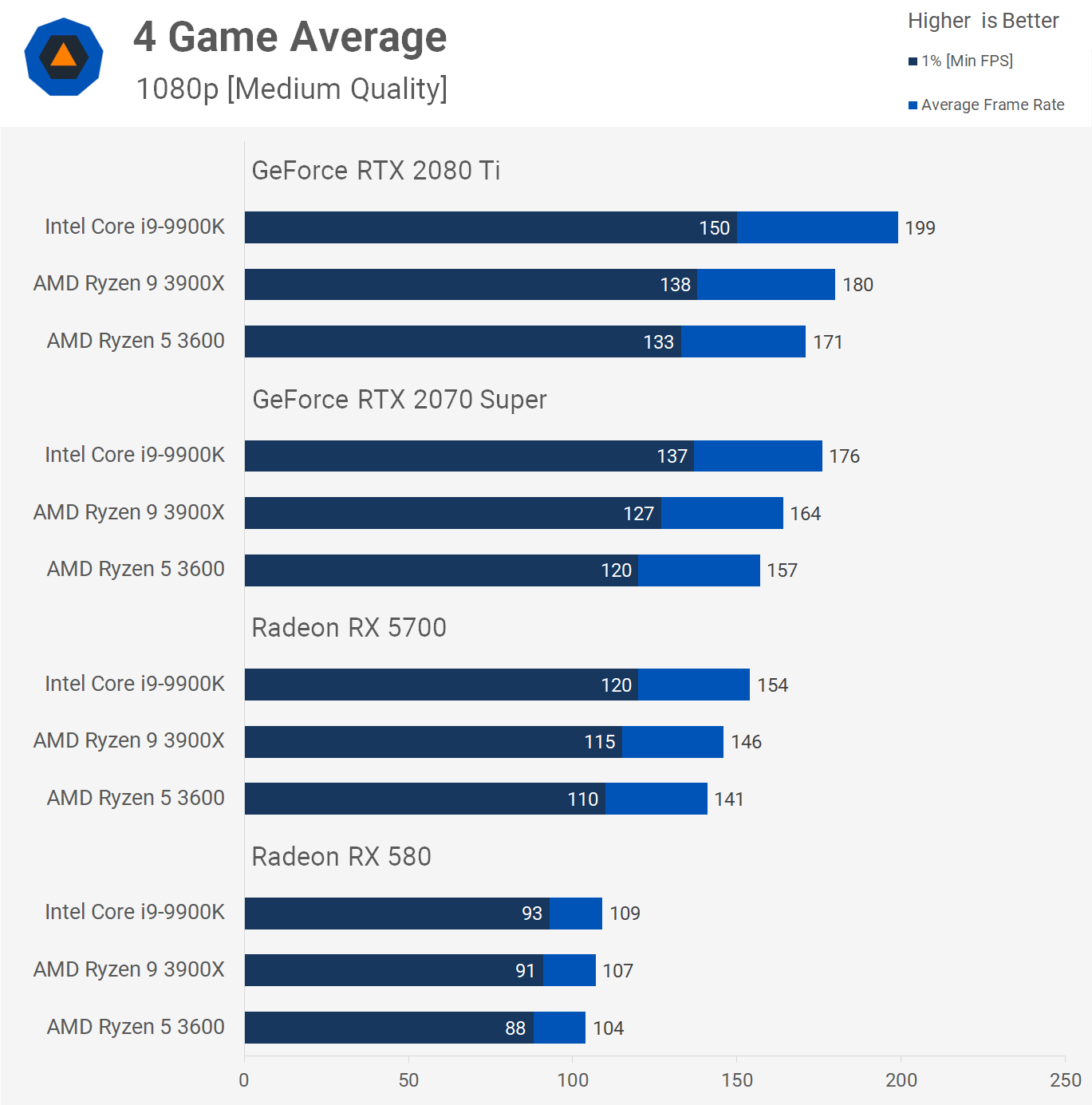
All of those are 1080p Low settings. What were the differences on medium and high? What GPU was used?
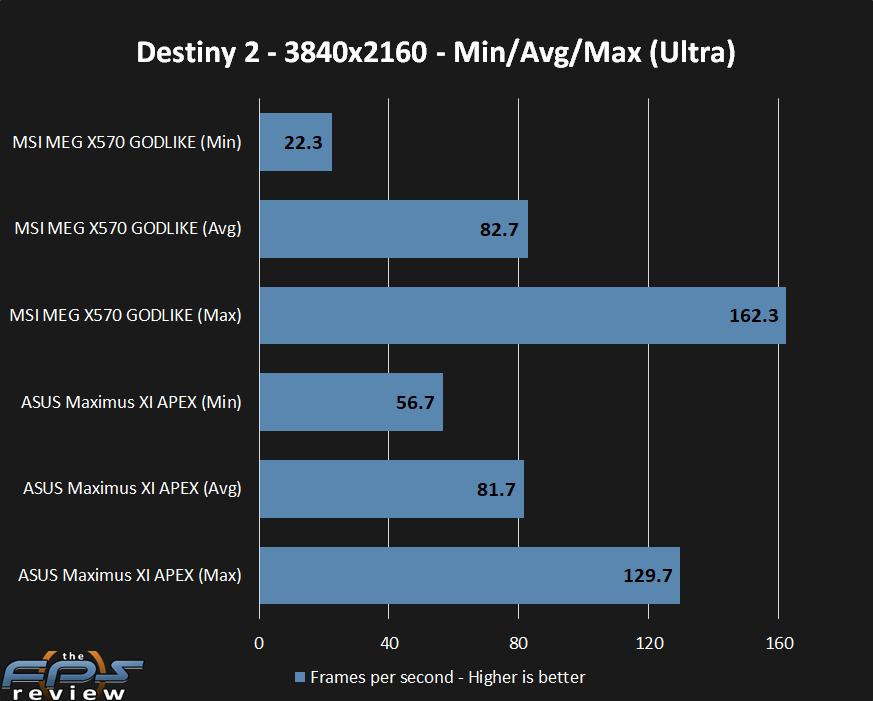
I've seen the reviews and videos. I own one. I didn't buy the 3800X for it's out of the box experience. I bought the 3800X to have the best 8 core Ryzen 3000 for pushing maximum performance. And I did this with a mere $30 price delta over the 3700X. My 3800X can do 4.5Ghz all core in games and benches all day long. One core will fail after running prime for a while but I don't play prime95. I don't see any 3700X doing that.The average Joe won't see a difference. The chip has already seen deep sales because it ain't selling. Watch the video, read the reviews. It's a dud.
Really depends on when you plan on upgrading either part. That's the reason that '1080p Low' results are important for CPU reviews and why reviewers don't just test 4k60 for CPU reviews and be done with it.Here are some comparisons with different video cards as the settings quality goes up and the graphics card goes down, the numbers even out. This is also where I think spending less on a processor and more on a video card would be beneficial.
So you don’t want a stable computer. O.K. https://xkcd.com/2250/I've seen the reviews and videos. I own one. I didn't buy the 3800X for it's out of the box experience. I bought the 3800X to have the best 8 core Ryzen 3000 for pushing maximum performance. And I did this with a mere $30 price delta over the 3700X. My 3800X can do 4.5Ghz all core in games and benches all day long. One core will fail after running prime for a while but I don't play prime95. I don't see any 3700X doing that.
So you don’t want a stable computer. O.K. https://xkcd.com/2250/
I’m the total opposite.
Stability is subjective. I want my desktop computer fo turn on everytime and play or do whatever I want to throw at it without a hiccup. And it does just that.
I get pushing hardware, and the joy out of getting more out of it -- but I also don't enjoy wondering if or when a system I'm using seriously (work or gaming or whatever) will crash. I agree with the difference that you've noted here. There's 'it works for now' and then there's actually stable.No.
There is Stablility, when all tested parts of the CPU perform without fault under a true 100% load (synthetic usually) indefinitely , and "Stable enough" which is what you described.
Do not confuse the two.
I agree it is a good gaming CPU. I just don’t think it is good value. $339 for the 3800X vs $396 for the 9700K.
Given that the AMD parts don't really overclock and the Intel parts do -- a better cooler for AMD is likely to only get you a little less noise under load, while it'll actually get you better performance with Intel.I hear you. $90 difference in Canada at moment, PLUS a half decent air cooler for the 9700K which is about $30 CAD.